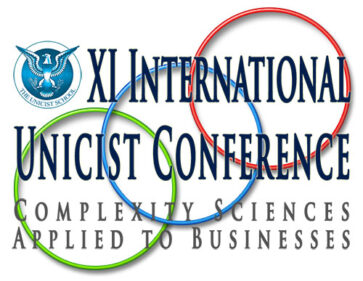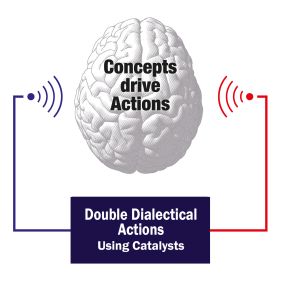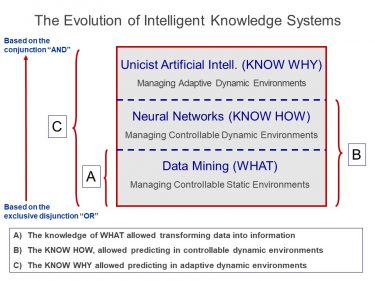The unicist logical approach allowed managing the adaptive aspects of businesses by using unicist logical tools and business objects. This approach provides cross-cultural solutions based on the researches made at The Unicist Research Institute. To access the basics that sustain unicist education please access:
www.unicist.org/sdp.shtml
Complex adaptive aspects of businesses need to be learned in their dynamics which implies that they need to be learned making real applications based on the knowledge of their dynamic structure.
This is analogous to medical residencies in teaching hospitals where graduated physicians learn to manage a specialty. It has to be considered that medicine is a paradigmatic case of complexity:
http://www.massgeneral.org/education/
The Future Scenario: Static vs. Dynamic Learning Processes
 The superior education in business management provided an empirical operational and analytical framework for business management that upgraded professionalism in the XXth century.
The superior education in business management provided an empirical operational and analytical framework for business management that upgraded professionalism in the XXth century.
The static empirical model that permitted administrating businesses provided the knowledge that allowed developing the necessary information technology that became redundant with the superior educational programs. Simultaneously, the explosive R&D capacity to release new products shortened their lifecycle.
These two situations, the redundancy of operational an analytical knowledge and the acceleration of business processes, made the static empirical approach to business become functional to business operation but dysfunctional to business management.
This scenario opened new demands for superior education in businesses that are still unsatisfied.
http://www.unicistinstitute.net/blog/the-10-year-scenario-for-superior-education-in-business/
The Next Step: “teaching hospitals” in the business field
 Unicist education is based on learning processes that are analogous to “teaching hospitals” based on real complex problem solving. The unicist educational model is a postgraduate model that deals with the learning of logical tools and business objects. You can access a white paper at:
Unicist education is based on learning processes that are analogous to “teaching hospitals” based on real complex problem solving. The unicist educational model is a postgraduate model that deals with the learning of logical tools and business objects. You can access a white paper at:
www.unicist.org/deb_wpue.php
It requires having the necessary technical-analytical knowledge learned in graduate or undergraduate programs.
It requires the learning of:
1) The building of future scenarios
2) Diagnosing businesses
3) Developing Unicist Strategies
4) Building Business Architectures
The difference between the Unicist Education and the Professional Education can be synthesized in:
|
Aspect
|
Unicist Education
|
Professional Education
|
| Educational Framework |
Teaching Hospital / Clinics |
Workshops / Seminars / Courses |
| Educational Model |
Complex Problem Solving |
Systemic Problem Solving |
| Learning Approach |
Action-Reflection-Action |
Theory-Practice |
| Problem Solving Approach |
Results Driven |
Tasks Driven |
| Future Forecasting |
Logical Inferences / Delphi Groups |
Projections / Delphi Groups |
| Knowledge |
Logical & Empirical Approach |
Empirical Approach |
| Type of Tools |
Unicist Logical Tools |
Operational-analytical tools |
| Business Planning |
Strategic approach |
Analytic approach |
| Dominant type of Analysis |
Fundamental Analysis |
Technical Analysis |
| Risk Management |
Ambiguity |
Certainty |
| Business Processes |
Adaptive Systems |
Operational Systems |
Educational Alternatives
We propose you compare the differences between unicist education and professional education by accessing the information on the unicist logical approach and the approaches to cross-cultural businesses of four major Global MBAs (2 in the USA and 2 in the EU).
We recommend beginning with the social communication of the different proposals.
1) Harvard Business School
https://www.facebook.com/HarvardBusinessSchool
2) Stanford Graduate School of Business
https://www.facebook.com/StanfordGSB
3) London Business School
https://www.facebook.com/LondonBusinessSchool
4) Insead – The Business School for the World
https://www.facebook.com/insead
5) Unicist Corporate University – The Unicist Research Institute
https://www.facebook.com/unicist
What is the Unicist Logical Approach to Businesses?
Learn about the Unicist Logical Approach at: http://www.unicist.net/clipboard
The unicist logical approach manages the adaptive aspects of business as unified fields based on the knowledge of their ontogenetic maps.

Unicist Active Business Library
The knowledge of the ontogenetic map of a business, its market and the context allowed managing the fundamentals that define the possibilities of business actions.
The future scenario building became possible based on the knowledge of the ontology of evolution and the ontogenetic maps of a business and its restricted and wide contexts.
This knowledge allowed defining synergic maximal strategies, to expand beyond the boundaries of a business, and minimum strategies to work within them.
Adaptive business processes became reliable based on the use of ontology based business objects. The use of objects upgraded the role of human work in business.
The integration of fundamental analysis and technical analysis allowed building reliable business knowledge, transforming uncertainty into risk and integrating the knowledge of the possibilities of success with its probabilities.
All the solutions, business objects, technologies and knowledge provided by The Unicist Research Institute are based on the unicist logical approach and generate significant energy saving effects.
You can find the Unicist Active Library at:
http://www.unicist.com
Teaching Hospitals in Business
The Unicist Corporate University (UCU) is the academic arm of The Unicist Research Institute that is organized as a Teaching Hospital that develops business residencies. It is based on technologies that allow building cross-cultural strategies: http://www.unicist.org/sdp.shtml#cc
The UCU is now expanding worldwide installing In-company Corporate Universities to provide the unicist technologies to deal with the adaptive aspects of businesses.
Unicist Press Committee
NOTE: The Unicist Research Institute was the pioneer in complexity science research and became a private global decentralized leading research organization in the field of human adaptive systems.
https://www.unicist-school.org/complexity-sciences/wp-content/uploads/2013/10/turi.pdf













